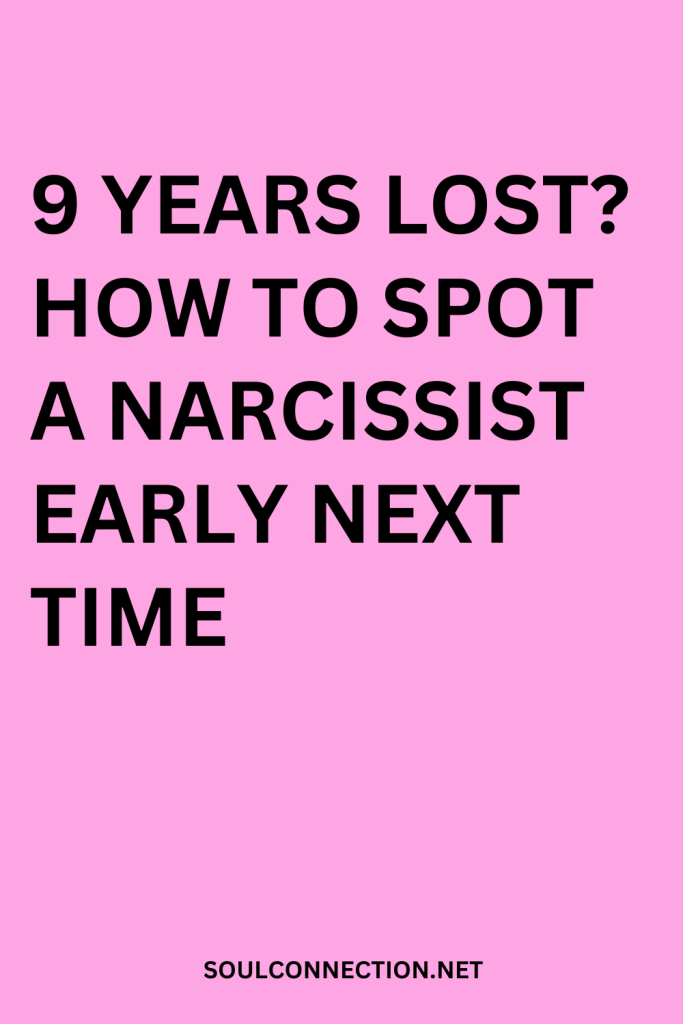Spent almost a decade with someone who was in love—with their own reflection? That “Did I just waste my life?” feeling is a special kind of heartbreak.
Before you spiral into monologue mode (preferably not into a mirror), let’s talk about how to spot a narcissist so you can save yourself from starring in a tragic sequel.
1. Blinding Charm and the Love-Bombing Olympics
Ever met someone who, in the first few weeks, seemed to know exactly what to say and when to say it?
Suddenly, you’re the star of their universe, showered with affection, flattery, and wild promises about your shared future, usually before they even figure out whether you’re a dog or a cat person.
This is less “wow, fate!” and more “wow, manipulation!” Narcissists tend to turbocharge relationships because they want to secure your admiration and attention.
Grand gestures, endless compliments, whirlwind intimacy—if it feels like you’re in a romcom montage, take a breath. Healthy relationships build slowly, not at warp speed.
2. Conversation Monopolizers
Try telling a narcissist about your day. You’ll get about three sentences in before the story magically becomes about them, their job, their ex, their new shoes—anything but you.
It’s like conversational chess, except they only play with queens and never let you touch the board.
Genuine interest in your opinions, dreams, or even what you had for lunch? Rare. If every chat leaves you feeling like a supporting character in your own life, that’s a clue.
People who care listen—even when your story is about the world’s most boring staff meeting.
3. The Empathy Black Hole
Empathy—narcissists talk a big game but struggle to deliver when it counts. Stressed about work? In tears over something that matters to you? Prepare for the emotional equivalent of tumbleweeds.
They might say the right words, but the comfort feels hollow, rehearsed, or somehow redirected to—surprise—them. Watch for how they handle your vulnerable moments.
If you constantly feel lonelier with them than alone, your gut’s waving a red flag.
4. Boundaries: What Are Those?
Narcissists treat emotional boundaries like a “suggestion box”—which they promptly ignore. They might show up unannounced, pressure you to overshare, or act possessive about your time and friendships.
If you ask for space or explain a need, you’ll get pushback, pouting, or outright guilt trips. Healthy partners respect your lines in the sand.
Narcissists? They treat sand like a blank page for drawing their name in all caps.
5. Jealousy Wrapped as Passion
A little jealousy now and then doesn’t mean you’re dating a narcissist. But persistent suspicion, accusations, or controlling questions about where you are and who you’re with?
That’s not love, it’s surveillance, dressed up as devotion.
Narcissists often see partners as extensions of themselves, not autonomous adults. If your phone gets policed or your social circle shrinks, it’s time to ask why one person needs that much power over your life.
6. Gaslighting as a Hobby
Ever leave a conversation more confused than when it started? Maybe you swore they said something—now they insist you’re “too sensitive” or “misremembering.” This is textbook gaslighting.
It’s not just about big lies. Sometimes, it’s dozens of little reality-benders that leave you doubting your memory, instincts, and even your sanity.
Healthy partners want you to trust yourself. Narcissists want you to trust only them.
7. The Charm Switch
Publicly, your partner could win “Most Likely to Be Loved by Strangers.” Friends rave about their charisma. Waiters get stories and winks.
But behind closed doors, that warmth evaporates faster than rain in the desert.
Narcissists excel at performance. If they treat you like a queen at parties but give you the cold shoulder at home, you’re dealing with someone who wears a mask for every occasion. Watch for the Jekyll and Hyde routine.
8. Accountability: Not Their Strong Suit
Mistakes? The narcissist doesn’t make them. Arguments? Always your fault. Problems? Caused by your “overreactions.”
You could catch them red-handed and they’d still explain why you’re to blame for bleeding on the carpet.
Expect apologies that sound more like accusations, and issues that never get resolved because—miraculously—they were never the problem.
Accountability isn’t just a relationship skill; it’s a sign they see you as an equal, not an accessory.
9. The Grand Exit (and the Boomerang Effect)
Eventually, the narcissist gets bored or threatened and disappears—dramatically, of course. Cue the silent treatment, sudden ghosting, or breakups designed to leave you questioning your worth.
But wait! After you start to heal, they resurface with apologies, promises, and declarations of undying love. This cycle can repeat for years—and each return chips away at your self-esteem.
Consistency is the opposite of narcissistic behavior; stability bores them, drama sustains them.
Spotting Narcissists: The Real-Life Toolkit
Wish there were a test to separate charmers from emotional vampires? Short of carrying around a pop-psych quiz, pay more attention to patterns than words.
Watch how they react to your boundaries. Notice how often conversations circle back to them. Trust those little “something’s off” moments, even if you can’t put your finger on why.
And try not to gaslight yourself—if you’re googling “Is my partner a narcissist?” ten times a month, your intuition’s probably onto something.
Trusting Yourself Again
Nine years with a narcissist can leave you doubting your judgment, as if your “picker” is permanently broken.
Spoiler: it’s not.
Most people are trained from birth to assume others are as honest and empathetic as they are. Narcissists take advantage of that.
Self-trust grows back, especially when you surround yourself with people who listen, respect your boundaries, and don’t require a spotlight to function.
Therapy helps, too—think of it as a gym for your self-worth muscles.
Forward, Not Backwards
Lost time is a real grief, but every lesson makes you wiser for the next round.
You know the signs now: lightning-fast romance, endless self-absorption, empathy on holiday, boundary trampling, jealousy as “passion,” reality denial, two-faced charm, never owning up, dramatic exits with boomerang returns.
The next time a new partner arrives with fireworks and flattery, you’ll spot the warning signs, sidestep the love-bomb crater, and choose someone who leaves your self-esteem intact.
And if you do slip up? Well, you’ll catch it sooner—and that’s nine years saved.
Now, where did you put that red flag?


